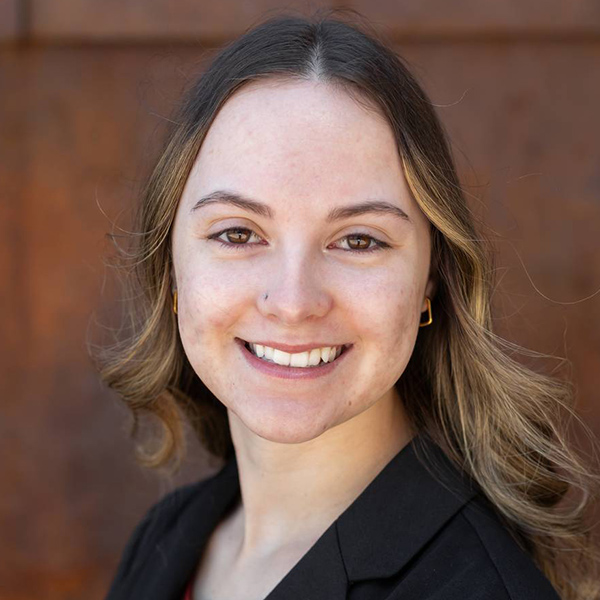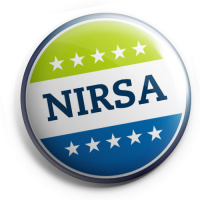Biography/Summary Resume
Caitlin Hoh began her journey in recreation with her first job at her local recreation center at the age of 16. She then entered her collegiate recreation journey at the University of Minnesota – Duluth (UMD) where she earned her bachelor’s degree in Exercise and Rehabilitation Science and is currently pursing a master’s degree in Environmental Health and Safety (MEHS). Caitlin joined the Welcome Desk staff as a freshman and quickly advanced into various departments and leadership positions. She currently works as a student manager for her gym’s Welcome Desk, Intramural and Club Sports, and serves on her department’s student advisory council. She was introduced to NIRSA and the opportunities that came with it during her junior year, and quickly became involved by joining as a member and attending the annual conference in Phoenix. Caitlin continued her NIRSA involvement by applying and accepting the position of Student State Representative for the state of Minnesota. Caitlin also has the honor of being selected as a winner of the William N. Wasson Student Leadership & Academic Award.
Please provide a statement of your personal views on the role and contributions of collegiate recreation in higher education. In your response, describe how collegiate recreation has influenced your development.
Collegiate recreation has been a life-changing part of my college experience. It helps form a community, constructs students’ individual and career development, and forms a web of support in a student’s college life. Campus recreation forms an escape from students’ tension, forms leaders and a work environment, and encourages students’ overall wellness through mental, social, and emotional wellness. For most students, including me, recreation is an opportunity for increased campus activity and a feeling of community, both of which have a significant impact on academic and life achievement.
I began my career in collegiate recreation during my freshman year of college at the Welcome Desk, initially seeing a job similar to the one I had back home and a fun way to earn money on campus. As I progressed toward a leadership position, I began seeing the impact recreation can have for students through development. As a student manager for working with Welcome Desk workers, intramurals, and club sports, I continued to develop my conflict resolution, in addition to creating a positive and welcoming atmosphere, and most importantly working in collaboration with students.
The most important part of campus recreation for me has been my development and the friendships, both social and professional. Several of my best friendships have been developed through working with co-workers, competing in intramural competitions, and working with them together for programs. It has also given me a community and group of both social and professional acquaintances that cannot even be put into words. Recreation participation has also produced experiences that have continued to widen my outlook on the field. By participating in NIRSA and NIRSA conferences, I have been in a position to network with professionals and other students with similar experiences.
Aside from development in professional skills and leadership, my work in recreation reaffirmed for me the role of physical activity in overall wellness. College life can become incredibly stressful, and having a refuge in which to prioritize exercise, blow off tension, and socialize with fellow students in a healthy environment is unexplainable. By participating in weight training, group fitness, and even planning for intramural tournaments, I have seen firsthand the significant impact recreation can have for mental and physical wellness.
I can say genuinely that my experiences at collegiate recreation have influenced my career, leadership development, and personal growth. It provided me with a chance to develop, serve, and contribute to a community focused on students’ success. It strengthened my intention to establish an environment in which students can become valued, empowered, and part of a community with one another. I have achieved success in my career, and I try to pay it forward and enable future students to have a similar positive impact on my life that I have gained.
Within the context of the NIRSA Strategic Plan, what area/item would you say is a major issue students face today? How would you address this issue during your term?
I believe that, within the context of the NIRSA Strategic Plan, one of the major issues students are facing today is how to balance their general well-being, especially their mental health while balancing the stress of academics and personal responsibilities. Between classes, jobs, extracurricular activities, and personal responsibilities, self-care takes a back burner. Greater stress, increased financial pressures, and the request to develop professional skills make recreation seem like a lower priority. However, campus recreation could be that opportunity in which ways to stay active, release stress, and engage with peers can be provided to students. As a NIRSA Student Leadership Team member, I would help to promote the reach of recreation programs and strengthen their role in the support of students’ overall well-being by advancing the mission of NIRSA in student health and engagement.
With my bachelor’s degree in Exercise and Rehabilitation Science, I have developed a deep understanding of the connection between physical activity and overall health. This background education has helped highlight that regular movement helps reduce stress, enhances mood, and improve cognitive function, but campus recreation’s role in mental health is often forgotten. Creating awareness of these benefits through promoting these benefits of campus recreation and possibly partnering with campus services would be important to address. Teaching students the importance of movement and mental health could be achieved through workshops on wellness, social media campaigns, or even peer-led discussions. Other emphases would fall upon more support and resources to the students who run these programs. Our student staff would need to understand and gain these benefits to help promote them.
Equally important, though, would be the ongoing expansion of inclusive programming. Adding more adaptive recreational options, low-barrier wellness programs, and social intramural leagues lower barriers to entering recreation. Being active should simply be an invitation to move in ways that bring joy and also feel good for one’s physical being.
Using my foundation of exercise science in combination with recreation experience over the past four years, I have witnessed positive ways in which movement influences overall mental and physical health. Awareness, accessibility, inclusivity, as well as a focus on mental health, are areas that recreation can build upon by following NIRSA’s Mission.
Describe your contributions to NIRSA (i.e. presentations, volunteering, previous leadership roles, etc.) and identify how your involvement and experiences qualify you to advocate for and serve the students of the Association.
My contributions at NIRSA have been focused on leadership, advocacy, and collegiate recreation engagement. As the 2024-2025 State Student Representative for Minnesota, I helped represent students and raise awareness for NIRSA programs. I have attended both the 2024 NIRSA Annual Conference and the 2024 Region V NIRSA Conference, meeting with leaders within this field, discussing best practices, and becoming increasingly knowledgeable about collegiate recreation’s role in student development.
Aside from direct service with NIRSA, my service in recreation is six years, four in collegiate recreation. I have operated in a variety of aspects in my recreation department, starting in a position at a Welcome Desk and working towards leadership, such as student manager for intramurals, club sports, and operations in a facility. I have gained a balanced perception of inner operations in recreation programs and students’ numerous needs through such experiences.
My bachelor’s degree in Exercise and Rehabilitation Science and my work in a medical background, such as my position as a Certified Nursing Assistant (CNA), have increased my skill at advocating for others even further. With my education in Exercise Science, I have gained a better understanding and background of the benefits of recreation. In a medical background, my position is to make my residents and my patients receive the best care, at times speaking for them when they cannot speak for themselves. I utilize such skills directly in my position in service and representing students of NIRSA. I enjoy the value of listening to concerns, searching for areas for improvement, and taking a stand in a positive manner in students’ experiences.
Through my recreation leadership experiences, my service with NIRSA, and the other jobs I have worked, I have developed strong advocacy skills to allow me effectively to represent Association students. I believe in creating a welcoming and caring environment in college recreation and in offering access for students to opportunity, care, and advocacy in a position that will allow them to thrive. By bringing together my experiences, I will make a contribution to the work of NIRSA and, in addition, learn and develop with a community of recreation professionals and student leaders.
The Student Leadership Team focuses on student development and Student Member recruitment and retention. What skills, talents, and perspectives would you bring to the Student Leadership Team that would contribute to this focus?
As a student manager in collegiate recreation, having a bachelor’s degree in Exercise and Rehabilitation Science, and additional outside job experience, I bring a unique combination of leadership, mentorship, and advocacy skills that align with the Student Leadership Team’s mission of student development, recruitment, and retention.
My strongest skills is leadership and student engagement. As a student manager in multiple areas, I oversee and help a diverse group of student. With training/onboarding, event planning, and supervising, I help my students build confidence, develop leadership skills, and stay engaged within recreation. My personal story/experience within campus recreation will also help with recruitment and assist in highlighting what campus recreation can offer.
Furthermore, my degree in exercise science puts me in a place to be able to emphasize the benefits of recreation to well-being, retention, and academic success for students that may not be reached by NIRSA directly. I would promote the benefits through outreach initiatives, peer-led programs, and campus partnerships in expanding student involvement in NIRSA.
I commit to supporting and strengthening the efforts of student recruitment and retention by teaching, wellness advocacy, and communication skills to ensure each student feels supported within NIRSA. I am so excited to bring my experience and passion for recreation to the Student Leadership Team.
Describe your leadership style. How will it benefit you and the rest of the Student Leadership Team?
My leadership style is most similar to the common Transformative Leader category. I often try to go out of my way to ensure that those on my team feel like they have a purpose with what they are doing. I often try to lead by example with my mood and attitude toward things and take a “glass half full” approach. This benefits me and would benefit the rest of the Student Leadership team because it helps increase motivation and drive. Often it is easy to have multiple individuals on a team get discouraged and the entire team follow, but with my leadership style, this is often one of the things I try to prevent. I think all of these will help in creating an accepting and inclusive Student Leadership Team that is open to new ideas.
As a member of the Student Leadership Team, you have the opportunity to leave a lasting impact on the field of collegiate recreation. However, we acknowledge and respect that you are a student first. Explain your strategies for maintaining a healthy balance between your various roles (student, volunteer, athlete, employee, etc.).
In my past 4 years as a student, I took on many responsibilities and have been able to balance these well with my education being my number one priority. I utilize multiple calendars and planners to help ensure that all of my responsibilities are being completed. I have learned over the past 4 years how to delegate work appropriately and acknowledge that I am unable to complete everything on my own. I also have built a very strong community of support around me including professional individuals that I have utilized to help me balance between my various roles.



